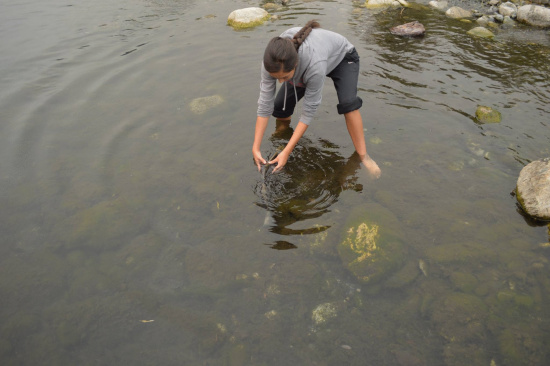Photo: Viv Orcutt, Hoopa Valley Tribe
The U.S. Bureau of Reclamation will be meeting in Arcata tomorrow evening to take comment on a draft environmental assessment that will govern emergency water releases on the Trinity this year, and in years to come. Such releases have common in recent years, as the feds are cajoled into releasing clean, cold Trinity water to improve conditions for salmon in the lower Klamath, but they have been controversial. Central Valley farming interests, who receive diversions from the Trinity, have battled the bureau and local tribes politically, and in court.
Now — as parasite levels on the lower Klamath approach those seen in the 2002 fish kill — the Bureau is attempting to formalize its procedures for such emergency releases. However, the entity with the biggest stake in the health of the Trinity — the Hoopa Valley Tribe — is not impressed by their efforts to date. The tribe will be among those protesting at the Bureau of Reclamation meeting in Arcata tomorrow night, 5:30 to 7 p.m., at the Red Roof Inn in Valley West. The Times-Standard’s Will Houston has a good overview of the issues in this morning’s paper.
From the Hoopa Valley Tribe:
Members of the Hoopa Valley Indian Reservation are facing a state of emergency. As Northern California is consumed by wildfires, it is neither safe to breathe the air nor drink the water. There are daily health warnings in place advising our members of degraded air and drinking water both of which are essential for human existence.
Last Friday, the Bureau of Reclamation (BOR) released an Environmental Assessment (EA) outlining proposed flow releases from the Trinity River to protect migrating Klamath-Trinity River salmon this year. However, BOR’s proposal does little to protect fish and does not use the best available science. The Hoopa Valley Tribe has submitted a scientific and technically sound proposal to protect returning Chinook salmon that BOR has rejected. Fisheries Director Mike Orcutt said, “It is disheartening after having put all of our resources into a good faith effort to develop a sound and scientifically valid proposal to have it be rejected.”
“Further, much to our dismay BOR now puts forth a scientifically untested and cumbersome proposal offered by federal agencies who profess to be fishery experts.” It seems that Interior is considering last minute proposals not intended to protect fish but rather meet political agendas (CVP water supplies) of San Joaquin Agribusiness. “Last year, we did the same Chinese fire drill. It’s now come to the 11th hour and we’re still entertaining arm chair quarterback approaches to protecting Klamath-Trinity River fish”.
BOR will finalize its EA on Friday, August 7
If a fish kill does occur it will be environmentally and politically devastating but a direct reflection to how this administration has managed water resources. Hoopa Tribal Chairman Ryan Jackson added “Another fish kill on the Klamath River would be devastating to North Coast communities, especially when Interior can still make the right choice and protect our culture and way of life”. “Why are our people reduced to hauling dead fish from our river , instead of working with our trustees to prevent the disease that BOR’s operations cause ?”
Everyone knows that the Klamath River is in the state of environmental collapse and daily reports on the conditions of the river foretell an imminent fish kill. Both Hoopa and Yurok Tribes have done everything in their power legally and scientifically to convince Interior. We fully intend to work with anyone that wants to help save Klamath Basin salmon. We’re hoping to get Humboldt County on board and collectively accomplish that.
Residents of Klamath and Trinity Rivers are fed up with the deplorable water conditions while our water is being piped over the hill to Central Valley agribusinesses. They have decided to protest the Bureau’s decision at a public scheduled scoping hearing on the Klamath River Long Term flow plan EIS on Wednesday.
PREVIOUSLY
- Huffman Demands Federal Action to Prevent Klamath River Fish Kill
- Feds Finally Assert Humboldt’s Right to Trinity River Water Under 1955 Agreement
- BOR Releases More Trinity Water in Response to the Appearance of Fish-Killing Parasite
- Central Valley Irrigators File Suit To Stop Trinity Water Releases

CLICK TO MANAGE